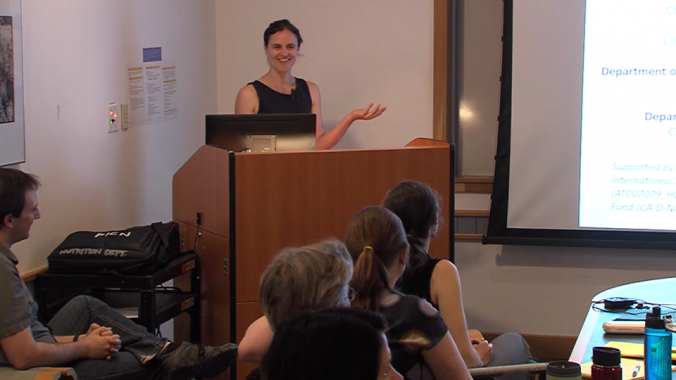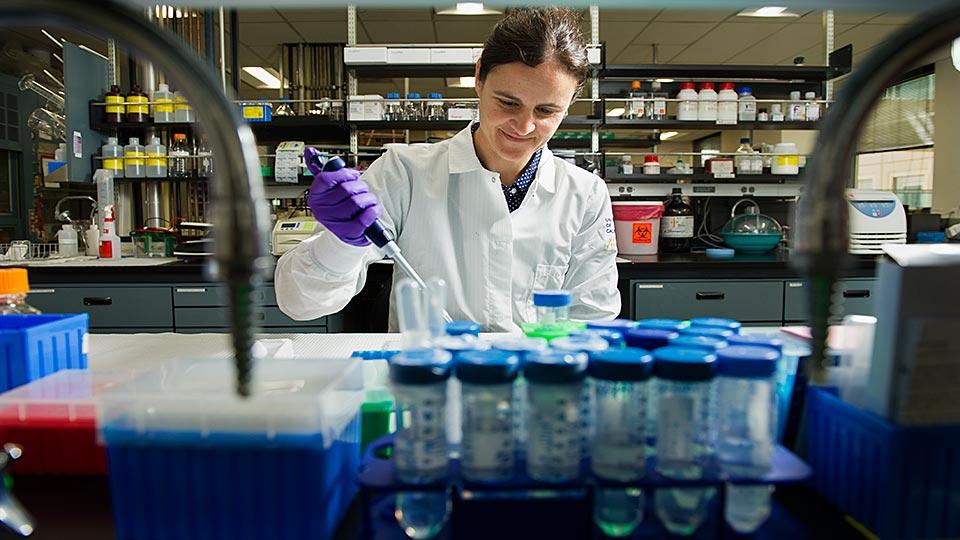The Zivkovic Lab was recently awarded a grant from the California Department of Public Health Alzheimer’s Disease Research Program to study the changes in HDL particles and exosomes across stages of dementia. The one-year project will support research using cutting edge technologies to discover how “liquid biopsies” can reveal disease processes related to lipid metabolism in the brain. The Zivkovic lab will collaborate with Dr. John Olichney, Professor in the Department of Neurology, and Clinical Core Director of the UC Davis Alzheimer’s Disease Center, and Dr. Carlito Lebrilla, Distinguished Professor in the Department of Chemistry to carry out this work.
Category: News (Page 1 of 2)
Dr. Zivkovic recently became part of the second phase of the NIH Common Fund funded Extracellular RNA Communications Consortium 2 (ERCC2). As site PI of this cooperative agreement Dr. Zivkovic is also working with UC Davis colleague Dr. Carlito Lebrilla and a team of collaborators including the project PI Dr. Ken Witwer, Associate Professor of Molecular and Comparative Pathobiology at Johns Hopkins University, Wyatt Vreeland at the National Institute of Standards and Technology (NIST), and Juan Pablo Tosar at the Faculty of Science in Uruguay.
The concept of a “liquid biopsy” is that molecules in easily-accessed biological fluids such as blood can tell us about processes occurring in less easily-accessed tissue compartments, such as the brain. Liquid biopsies are an exciting new strategy for biomarker discovery and for the development of therapies. Extracellular RNA (exRNA) is a particularly attractive molecular component of liquid biopsy because RNA species can be specifically amplified, and certain short RNAs (sRNAs) such as microRNAs (miRNAs) are highly stable because of small size and association with protective binding proteins. exRNA are transported in blood in distinct RNA carriers including extracellular vesicles (e.g. exosomes), lipoprotein particles (e.g. HDL and LDL), and free ribonucleoproteins.
In this ERCC2 project, Drs. Zivkovic and Lebrilla are working with the rest of the team to develop novel methodologies to isolate and characterize the three main subclasses of exRNA carrier particles. The team is incorporating advanced technologies for particle isolation including size exclusion chromatography and asymmetrical flow field flow fractionation, and for characterizing the particle characteristics and contents including dynamic light scattering and liquid chromatography mass spectrometry.
The Zivkovic Lab is recruiting human subjects for the Fiber Study. The purpose of this study is to investigate whether consuming a packet of fiber powder per day changes the composition and/or function of the gut microbiota and high density lipoproteins (HDL) or good cholesterol.
More Information
Post Doctoral Scholar – Zivkovic Lab
APPLY NOW
Recruitment Period
Open date: January 25th, 2019
Next review date: March 1st, 2019
Apply by this date to ensure full consideration by the committee.
Apply by this date to ensure full consideration by the committee.
Final date: July 1st, 2019
Applications will continue to be accepted until this date, but those received after the review date will only be considered if the position has not yet been filled.
Applications will continue to be accepted until this date, but those received after the review date will only be considered if the position has not yet been filled.
Description
Postdoctoral Research Associate in the Department of Nutrition at the University of California, Davis. The postdoctoral researcher will work in the Zivkovic Lab on projects related to HDL functional biology. The Zivkovic Lab specializes in the functional biology of HDL particles, particularly in the context of dietary modulation and in chronic inflammatory conditions such as Alzheimer’s Disease. The Zivkovic Lab studies the relationship between diet, the gut microbiome, and HDL. Specifically, we:
• Utilize -omic technologies to characterize the composition of HDL particles and the composition and function of the gut microbiome
• Isolate HDL by size exclusion chromatography and characterize the interactions between HDL particles and immune cells, particularly macrophages, to understand the immunomodulatory capacity of HDL under a variety of conditions
• Synthesize HDL particles to test the effects of specific compositional and structural alterations on functional capacity
• Apply and develop bioinformatics tools to integrate, visualize, and analyze multi-omic and clinical data
This position is primarily to conduct experiments in the Zivkovic Lab by working closely with PI Dr. Angela Zivkovic, as well as graduate and undergraduate students in the lab. The postdoctoral researcher will have primary responsibility for specific aims of a recently funded NIH grant on the links between HDL composition and function, and Alzheimer’s Disease, with a specific emphasis on the impact of glycosylation. The postdoctoral researcher will be expected to design and conduct experiments based on project tasks, process, analyze, and interpret data, train and oversee graduate and undergraduate students on specific lab tasks (described below), and prepare project reports, technical publications, and presentations.
Qualifications: Applicants should have a Ph.D. in Nutritional Biology, Molecular Cell Biology, Lipidology, Physiology, or related field. The qualified candidate will have the ability to conduct independent research. Excellent oral and written communication skills and a team-oriented perspective are required. Experience with the following laboratory techniques is preferred:
• FPLC, HPLC, LC-MS
• Cell culture (particularly immune cells)
• Basic biochemical techniques (ELISA, GE, WB, Ficoll extraction and other sample prep)
• Computational biology/programming (R, gut microbiome data analysis tools)
• Immunoprecipitation
• PCR
• Microarrays
• Electron microscopy
• MS-based metabolomics, proteomics, lipidomics, glycomics techniques
• 16S/shotgun sequencing
Job location
UC Davis, CA
Learn More
More information about this recruitment: http://zivkoviclab.ucdavis.edu
Requirements
Document requirements
- Curriculum Vitae – Your most recently updated C.V.
- Cover Letter
- Statement of Contributions to Diversity – Diversity contributions documented in the application file will be used to evaluate applicants. Visit http://academicaffairs.ucdavis.edu/diversity/equity_inclusion/index.html for guidelines about writing a diversity statement and why one is requested.
(Optional) - Sample of related publications
Reference requirements
- 3-5 required (contact information only)
How to apply
- Create an ApplicantID
- Provide required information and documents
- If any, provide required reference information
Get started: Apply Now
Angela Zivkovic and colleagues were recently awarded $3.4M NIH grant funded over five years to study the comprehensive characterization of glycosylation alterations in Alzheimer’s Disease. The NIH grant is a multi-PI grant with Carlito Lebrilla and Lee-Way Jin as PIs and Angela Zivkovic as the contact PI, titled “Comprehensive Characterization of Glycosylation Alterations in Alzheimer’s Disease”.
Alzheimer’s Disease is a neurodegenerative disease with enormous societal impact; solutions are needed to reduce the costs and healthcare burden of Alzheimer’s Disease and to improve quality of life for a growing number of aging Americans. In this project, newly developed glycomic and glycoproteomic methods will be used to comprehensively characterize the glycans attached to proteins and lipids in the brain and in plasma lipoproteins. The successful completion of this project will lead to the development of biomarkers for screening and early detection of Alzheimer’s Disease, and targets for the prevention and treatment of inflammation in Alzheimer’s Disease.
Says Zivkovic, “We will be analyzing the glycosylation changes in the brain and in plasma lipoproteins, and we will also look at how changes in the composition and functionality of HDL particles in Alzheimer’s Disease affects mechanisms related to neuroinflammation pathways. We are leveraging Dr. Lebrilla’s expertise in glycobiology and analystical chemistry, Dr. Jin’s expertise in Alzheimer’s Disease and neuropathology, and my expertise in HDL functional biology to make this project possible. We are also leveraging seed funding from the UC Davis Alzheimer’s Disease Center Pilot Grant Program and the UC Davis Collaborative for Diagnostics Innovation Pilot Grant Program, which both enabled us to produce preliminary data that was used to obtain this grant.”
The UC Davis Alzheimer’s Disease Center announced three recipients of the 2018-19 research pilot grants. Each researcher will receive $32,000 funded by National Institute on Aging (NIA) Alzheimer’s Disease Center program to pursue pilot projects related to Alzheimer’s disease and other dementias with the goal of generating data to support future research applications.
This year’s recipients include Dr. Angela Zivkovic whose project is titled “Influence of Glycosylation on HDL Function in Alzheimer’s Disease.” Dr. Zivkovic and her team will use newly developed glycomic and glycoproteomic methods to comprehensively characterize the glycans attached to proteins and lipids in the brain and in plasma lipoproteins. The ultimate goal of the project is to develop biomarkers for screening and the early detection of Alzheimer’s disease and targets for the prevention and treatment of inflammation of Alzheimer’s disease.
For 27 years, the NIA has provided funding to the Alzheimer’s Disease Center as an Alzheimer’s Disease Core Center. Since 2000, nearly $1 million has been invested in pilot awards from the UC Davis Alzheimer’s Disease Center grant.
The UC Davis Alzheimer’s Disease Center is one of only 32 Alzheimer’s research centers designated by the National Institutes of Health’s National Institute on Aging as a center of excellence. The center’s goal is to translate research advances into improved diagnosis and treatment for patients while focusing on the long-term goal of finding a way to prevent or cure Alzheimer’s disease.

Watch Dr. Zivkovic’s presentation titled “Milk composition is associated with growth and morbidity outcomes via the gut microbiota in Gambian infants”
On May 11th, 2017 Dr. Zivkovic presented at the UC Davis Program in International & Community Nutrition weekly seminar series. Her talk is titled Milk composition is associated with growth and morbidity outcomes via the gut microbiota in Gambian infants.
Watch the Video
References
Davis JC, Lewis ZT, Krishnan S, Bernstein RM, Moore SE, Prentice AM, Mills DA, Lebrilla CB, Zivkovic AM. Growth and Morbidity of Gambian Infants are Influenced by Maternal Milk Oligosaccharides and Infant Gut Microbiota. Sci Rep. 2017 Jan 12;7:40466. [Article]

By Pat Bailey, UC Davis News and Media Relations
To most of us, HDLs, or high-density lipoproteins, are simply tiny, cholesterol-rich particles that act as the biochemical “good guys” in the battle against clogged arteries and coronary heart disease.
But a team led by University of California, Davis, researchers found that not all HDLs are alike. The amounts and specific structure of complex sugars called glycans in these particles can powerfully influence the body’s inflammatory and immune responses.
The composition of these HDL sugars differentiated healthy individuals from those with metabolic syndrome and from those who were diabetic and undergoing dialysis, the researchers found. Even more interesting, the ability of HDLs to tame the inflammatory response of immune cells was associated with the composition of these sugars.
“HDLs are these cool little particles, but they are incredibly diverse in composition,” said the study’s lead author Angela Zivkovic, an assistant professor in the Department of Nutrition, whose research focuses on personalized or “precision” nutrition. “They continually remodel themselves, gaining new functions as they change.”
“Based on the findings of this study, we anticipate that profiles of the glycan-containing glycoproteins in HDL particles could provide valuable biomarkers for predicting a person’s susceptibility to inflammatory diseases and to certain types of infections,” she said.
Zivkovic and colleagues have reported their findings online in Nature’s Scientific Reports and filed a patent application on the newly identified process.
More than meets the eye
During the past decade, scientists have discovered that HDLs not only help prevent the hardening and narrowing of the arteries associated with heart disease and stroke, but also play key roles related to the body’s inflammatory and immune responses.
It also has been shown that HDLs’ anti-inflammatory capacity is reduced in people with Type 2 diabetes or metabolic syndrome, which is characterized by high blood pressure, obesity, low HDL levels and high blood sugar and triglyceride levels.
“We wanted to know what makes some people’s HDL anti-inflammatory and other people’s HDL pro-inflammatory,” Zivkovic said.
The relationships between HDLs and the immune system are poorly understood, and researchers are looking for new connections that may explain how HDLs interact with the immune system to turn inflammation on or off.
HDL: A complicated history
At first, it seemed that the connection between HDL and health was straight-forward: the more HDL a person has circulating in their bloodstream, the less likely they are to get heart disease. But drugs that increased HDL levels failed in clinical trials: patients who were on the drugs actually had a higher likelihood of dying.
“We now know that it is not just the amount of HDL in your bloodstream that counts, but exactly what proteins and fats the particles are made of,” Zivkovic said. The glycans attached to those proteins and fats act as keys to let the HDL particles do their job, she said.
Using a sophisticated analytical system developed by Professor Carlito Lebrilla in the UC Davis chemistry department, Zivkovic and Lebrilla were the first to demonstrate that HDL particles are not “naked,” as depicted in most textbooks, but instead are covered with glycan sugars. They then showed that measuring the amounts and types of these glycans on HDL could identify people who have heart disease. Their next question focused on whether these sugars affect the function of HDL.
The new study
Zivkovic and colleagues set out to examine just how HDLs’ composition impacts their capacity to influence the immune system.
The researchers analyzed HDL glycans from 50 patients, identified as being either healthy, diabetic and receiving dialysis treatments, or exhibiting symptoms of metabolic syndrome.
The analyses revealed that the patterns of attachment of the glycans to the HDL proteins were characteristic of the patients’ health status.
More importantly, the glycan profiles indicated which individuals’ HDLs were boosting or inhibiting production of interleukin 6, a protein related to the body’s inflammatory response.
“What’s exciting is that the traditional markers of disease risk, like LDL cholesterol levels, BMI (body mass index), and blood pressure were not able to predict whose HDL would be pro- vs. anti-inflammatory, but the glycan profiles of their HDL did,” Zivkovic said.
Looking toward new therapies
Zivkovic said that additional studies of larger patient groups are now needed to explore the influences of gender and age on HDLs’ influence on the immune responses.
“Now we want to see what we can do to change the glycosylation of a person’s HDLs,” Zivkovic said. “As a nutritionist, I am looking at dietary approaches, but to a cardiologist, that might mean new medicines to alter HDL glycosylation.”
Collaborators and funding
Working with Zivkovic and Lebrilla on the study were Emanual Maverakis, Sridevi Krishnan, Michiko Shimoda, Romina Sacchi, Muchena J. Kailemia, Guillaume Luxardi, George A. Kaysen, Atul N. Parikh, Viviane N. Ngassam and Jennifer T. Smilowitz, all of UC Davis; Kirsten Johansen and Barbara Grimes, both of UC San Francisco; and Glenn Chertow of Stanford University.
Funding for the study was provided by the National Institutes of Health, the California Agricultural Experiment Station Hatch Act Fund, the Burroughs Wellcome Fund, and the National Institute of Diabetes and Digestive and Kidney Diseases.
Media contact(s)
Angela Zivkovic, UC Davis Dept. of Nutrition, 530-554-2534, amzivkovic@ucdavis.edu
Pat Bailey, UC Davis News and Media Relations, 530-219-9640, pjbailey@ucdavis.edu
Media Resources
UC Davis Egghead Blog article on “Changes In Breast Milk Sugars Impact Babies’ Health And Growth” features Zivkovic’s recent paper in Scientific Reports.
Dr. Zivkovic’s research was recently featured in a University of Colorado article “Mother’s milk changes with the seasons, influencing baby’s well-being” (the article also received the attention of NBC radio news).

